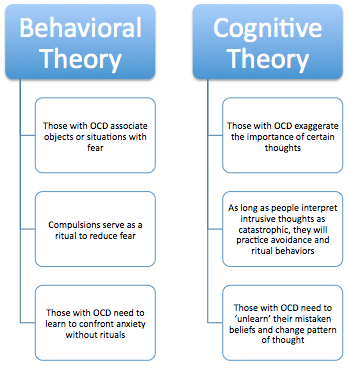Obsessive-compulsive disorder is an anxiety disorder in which sufferers use ritualistic complusions to combat the anxiety associated with intrusive, obsessive thoughts.
Obsession: Recurrent and persistent thoughts, impulses or images that are intrusive and/or inappropriate and cause marked anxiety and distress.
Compulsion: Repetitive behaviours or mental acts designed to counteract the anxiety caused by the obsessions.
The DSM-IV describes the essential features of obsessive-compulsive disorder as recurrent obsessions or compulsions that are severe enough

to be time consuming or cause marked distress or significant impairment. At some point during the course of the disorder, the individual has recognized that the obsessions or compulsions are excessive or unreasonable.¹
Almost half of all reported cases of OCD show a familial pattern.² There have not been any specific genes found to be linked to OCD yet, but research suggests that parents, siblings and children of a person with OCD have a greater chance of developing OCD than someone does with no family history of the disorder.²

Behavioural and Cognitive psychologists have come up with psychological reasons to explain the development of OCD. The two most common theoretical frameworks for these theories are behavioral and cognitive. These frameworks understand the root causes of OCD to be different and therefore aim to treat them differently.
Behaviorists view compulsions as a ritual to reduce fear and therefore think sufferers need to come up with better and healthier defense mechanisms to reduce this fear.
Cognitive theorists believe that for one's behavior to change (compulsions), one must first actually alter how they think (obsessions). Therefor, they believe that those who suffer from OCD need to unlearn the false or exaggerated obsessions in order to be free from compulsions.
References:
1. APA (1994). DSM-IV. [ONLINE] Available at: http://allpsych.com/disorders/dsm.html. [Last Accessed 9.12.2013].
2. Centre for Addiction and Mental Health (2001). What Causes OCD?. [ONLINE] Available at: http://www.camh.ca/en/hospital/health_information/a_z_mental_health_and_addiction_information/obsessive_compulsive_disorder/obsessive_compulsive_disorder_information_guide/Pages/ocd_causes.aspx#genetic. [Last Accessed 9.12.2013]
© BrainMass Inc. brainmass.com July 26, 2024, 6:50 pm ad1c9bdddf